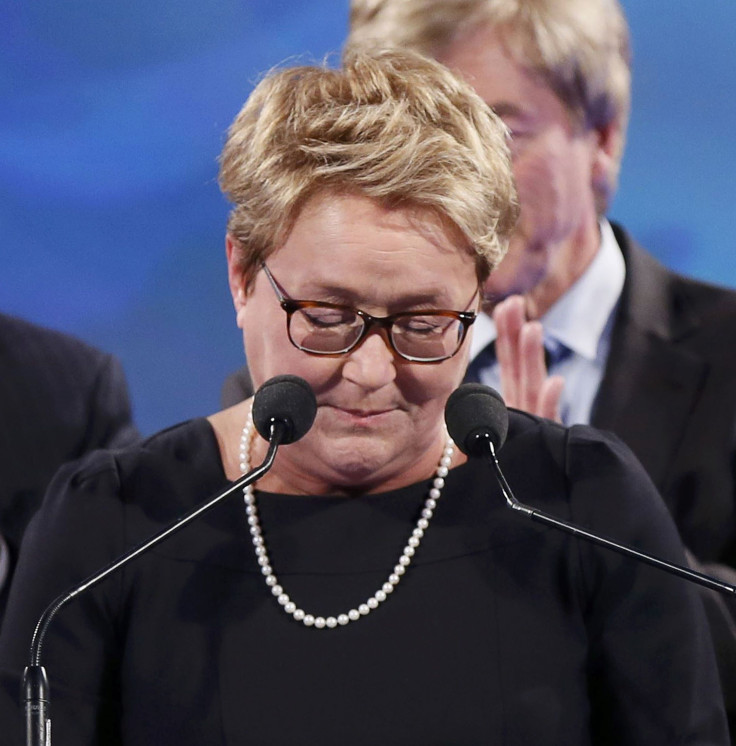Canadian Business Community Optimistic After Quebec Separatist Party Ousted

A loss for Quebec’s separatist party in Monday's election looks like a gain for businesses in Canada and abroad, say analysts.
The Canadian dollar ticked up this week after the Parti Quebecois was ousted from the provincial government, making way for a Liberal Party majority government.
Quebec, home to multinationals such as transportation giant Bombardier Inc. (TSX:BBD) and state-owned Hydro-Quebec, is expected to benefit from a period of relative stability under the Liberals, say analysts. While the PQ’s economic agenda hinged on an increase in manufacturing, the new government is likely to revive a plan to industrialize the north and explore oil production to help pay off the province’s substantial debt, all without the looming threat of yet another referendum on seceding from Canada.
“The much-feared risk of another sovereignty vote has been put to rest by the defeat of the PQ at the hands of the Liberals,” said David Rosenberg, chief economist and strategist at Gluskin Sheff & Associates Inc. in Toronto, in a public statement.
The Canadian dollar gained a little over half a cent this week to hit 91.7 cents per U.S. dollar on Wednesday. It’s a modest increase, but the Liberal win had been widely anticipated by the markets.
Most didn’t expect a sweeping victory for the PQ since its leader Pauline Marois called a snap election last month, trying to gain a majority. The party had ruled with a minority of the seats in parliament for a mere 18 months. Though the PQ is known for its separatist agenda, the Marois government placed a higher priority on imposing a secular "Quebec values" charter (which backfired for many voters) and instituting vast changes in economic policy.
“I think there’s a sigh of relief really to see the PQ sort of exit stage right,” said David Cockfield, a fund manager with Northland Wealth Management in Toronto. “Partly because that sovereignty issue just is not good for business, particularly for people from outside the province thinking of investing in it.”
Cockfield explained that in the 1970s, when the party first came to power, Montreal and Toronto were vying for primacy as Canada’s financial capital. People in the business community actually preferred bilingual Montreal as a place to live and work.
“But along came the PQ, and money quickly started exiting head offices,” he said. Today Toronto is by far the country’s financial capital and Montreal is competing on a second or third tier.
The Quebec economy largely depends on manufacturing and industry, but these areas have been shrinking lately. Oil-producing provinces such as Alberta have been growing much faster.
However, one of the primary initiatives of Marois' brief premiership was to reinvest in Quebec’s industrial sector and charge more fees on existing oil operations in the north.
“The PQ had really tried to put an emphasis on developing Quebec’s economic potential around the electrification of the transport sector globally,” said Tyler Meredith, research director at the Montreal-based Institute for Research on Public Policy.
Indeed, the province is home to many large companies such as Bombardier, the multinational aerospace and rail transportation manufacturer, worth $5.85 billion. And the Montreal-based Hydro-Quebec exports power to Ontario, New York, New England and the Midwest in the United States, with exports yielding profits of more than $360 million CAD in 2012.
The PQ government supported these industries in an attempt to make the Quebec economy as independent as possible and adopted measures such as a substantial hike in royalty rates on mining activity in the northern regions, where there are substantial oil reserves -- a major blow to what could have been a strong industry.
In the first decade of the century, Quebec ranked in the top 10 locations of the Fraser Institute’s Global Mining Survey, taking the top spot from 2007 to 2009. But after the PQ came to power in 2012 and raised royalty rates, the province dropped to 11th place worldwide in the 2012-2013 rankings.
Marois did make an attempt to break into the oil industry two months ago, with a proposed fracking initiative, but was soon shut down by environmental activists.
“The most important thing for investors is not so much rates, but certainty,” said Meredith, explaining that under the previous Liberal government, investors were more confident in future infrastructure and sustainable business.
“After the PQ was elected, it wasn’t as clear,” he said.
The newly elected Liberal leader, Philippe Couillard, has a lot of tasks ahead of him, and getting a measure of the financial situation is chief among them. This includes a $1.75 billion CAD deficit, the largest in Canada.
“The financial state of Quebec under Parti Quebecois was precarious at best,” said Lorne Switzer, a finance professor at Concordia University in Montreal, adding that a Liberal win is appealing for businesses and investors.
“For the business community, predictability and political stability are important elements that are considered in their decisions to invest,” said Yves-Thomas Dorval, president of the Quebec Employers Council, in a public statement.
© Copyright IBTimes 2024. All rights reserved.












